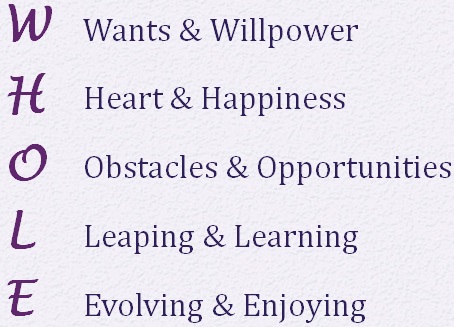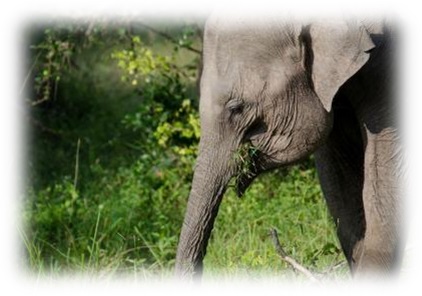A Coaching Model Created by Sarah Jefferies
(Transformational Coach, UNITED KINGDOM)
 Wholehearted living
Wholehearted living
This ‘WHOLE-HEARTED coaching model is inspired by the work of Brene Brown PhD, who is a “Researcher-Story Teller” on the topic of wholehearted living. Brown’s extensive research concluded that vulnerability, compassion and courage are essential constructs to living life in a wholehearted way. This requires us to think, feel and act from an authentic place within ourselves, so we remain true to who we are as individuals, rather than adjusting or perfecting ourselves to fit to the ‘norms’ expected of us within society.
Wholehearted living is about engaging in our lives from a place of worthiness. It means cultivating the courage, compassion, and connection to wake up in the morning and think, “No matter what gets done and how much is left undone, I am enough”. It’s going to bed at night thinking, “Yes I am imperfect and vulnerable and sometimes afraid but that doesn’t change the truth that I am worthy of love and belonging.” (Brene Brown, ‘The Gifts of Imperfection’)
This model is intended to serve clients within the life and transformational coaching domain. Those who aspire to achieve a greater sense of something, aspire to be something and/or hope for more something! It’s intended to help the client discover strength from inside, rather than external sources; strength from living with a whole heart.
It requires the coach to facilitate a values-based coaching process; exploring the deeper constructs within the client, such as their intuition, their life purpose, their authentic self and their source of genuine happiness.
Being WHOLE

Wants & Willpower

Wants: This first phase of the model is intended to bring about awareness in the client of what they truly want to achieve; both in life and also more specifically from the coaching. This phase is about dreams and ideals, then refined into clear and transparent goals.
Willpower : Whilst in this phase, it’s important to set ‘wants’ into context, by understanding how important goal-achievement is to the client; what it truly means to them and how this achievement will impact their wellness, relationships, career, esteem, finances etc …i.e. their life! This is about aligning the clients’ goals to their authentic & best-self.
Relevant Coaching Tools & Methodology (for coaches only, not marketing purposes):
Creating trust in the initial stages is critical to ensure the client can be as open and transparent about their true desires, no matter however selfish, crazy or ambitious they might perceive them to be. They need to be able to feel entirely comfortable sharing and opening up. As the coach we must create the sense of equality and partnership with the client.
Power listening is an excellent way to create trust at this stage. Especially if the client has never been coached before, the personal space you create for them may be a new experience entirely. Repeating their words back to them and openly sharing your observations of their energy levels, body language, obvious structures/limiting statements they hold etc may help to create a new awareness within the client. At the same time, the client will begin to experience the value of coaching if they achieve new perspective/realisation of themselves at an early stage; thus generating a greater commitment to the coaching relationship as well.
Mindfulness is always critical in a coaching conversation, but it is especially important in these initial stages, as you are getting to know them as a person. It remains essential to release judgment as you learn about their goals and dreams, as these may well differ to you.
Visualisation can be a useful tool in these early stages to help the client reveal their inner desires. Taking them through a process of seeing, sensing and feeling their future/their perfect day/their best-self will enable them to really dive into both their ‘wants’ and determine their own level of ‘willpower’.
Commitment vs. Trying as a power tool can be used, even at this early stage. You can use this to determine what they have done so far, how much they have persevered and may help understand what has and hasn’t been effective. This power tool may help bring about awareness of their true commitment and intention to achieve their goal.
Power Questions that can be applied through the ‘Wants & Willpower’ phase are:
Wants
Willpower
Heart & Happiness

Heart: It’s time to dig deep. This phase is an exploration of the client’s values and beliefs. It’s about tuning into their intuition to better understand what their inner guidance system is telling them. This requires the client to gain awareness of limiting beliefs, gain a strength of character & individuality, and establish an emotionally stable and confident place from which to operate from.
Happiness: Along with the deep dive into the individual’s true ‘heart’ will accompany an exploration about their happiness, in order to understand what/how they can achieve a heightened sense of fulfillment. After all “The purpose of our lives is to be happy” (Dalai Lama).
Relevant Coaching Tools & Methodology:
Values and life purpose are the core component of this phase. For many, these are big, philosophical concepts for clients to identify, as they sit within the core of our being, the core of who we are, and are often not discussed or even acknowledged. Addressing them in this early phase helps to provide a platform for authentic change to evolve from.
Underlying beliefs are important to identify during this phase. These are the seeds of thoughts that guide us day-to-day. Identifying them and moreover determining how effectively they are serving the client is critical. Limiting beliefs can create negative feelings/emotions that guide the client to behave in a way that is detrimental and inhibiting of achieving their goal. Changing limiting beliefs can help unlock a renewed sense of self-awareness, energy, optimism and courage in the client.
Cognitive Behavioural Therapy (CBT) & Neuro-Linguistic Programming (NLP) techniques can be of use in this stage to help with reframing perspective. They can be used to help work with the transformation of limiting beliefs to a more positive mindset.
Truth vs. Fraud as a power tool, may be required to challenge the client; ensuring that they are speaking and acting from a place that is true to their core values.
Lightness vs. Significance is a power tool that can be used to help maintain a positive mindset in the client. Exploring the topics of ‘heart & happiness’ can be emotional work; uncovering unpleasant, surprising or painful beliefs. Coaches can add value to the conversation by bringing a lighter, forward-focused perspective. To be used with caution however, so as not to undermine the emotional gravity of the experience for that individual.